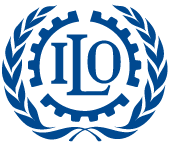International Labour Organization (ILO)

Mr. Thoralf Stenvold
Senior Specialist – Global Governance
Multilateral Cooperation Department
Tel: +41 22 7996111
E-mail: Stenvold [at] ilo.org
4, route des Morillons, CH – 1211 Geneva 22, Switzerland
Tel: +41 22 7996111
E-mail: Stenvold@ilo.org
Web: www.ilo.org
EMPLOYMENT
The International Labour Organization (ILO) is the UN specialized agency devoted to advancing opportunities for women and men to obtain decent and productive work in conditions of freedom, equity, security, and human dignity. Its main aims are to:
-
Promote and realize standards and fundamental principles and rights at work;
-
Create greater opportunities for women and men to secure decent employment and income;
-
Enhance the coverage and effectiveness of social protection for all; and
-
Strengthen tripartism and social dialogue in handling work-related issues.
In promoting social justice and internationally-recognized human and labour rights, the organization continues to pursue its founding mission, which was based on the premise that labour peace is essential to prosperity. Today, the ILO helps advance the creation of decent jobs and the kinds of economic and working conditions that give working people and business people a stake in lasting peace, prosperity, and progress.
While the 2030 Agenda for Sustainable Development makes full and productive employment and decent work for all a central priority for economic policy in the 21st century, as confirmed in Sustainable Development Goal number eight (SDG 8), it also makes clear that promoting a universal, rules-based, open, non-discriminatory and equitable multilateral trading system under the World Trade Organization is important, as expressed in SDG 17 on means of implementation. As such the 2030 Agenda highlights how trade is an important means to achieving the SDGs, including full employment and decent work for all. The ILO conducts a number of activities which aim to contribute to a positive relationship between trade, employyment and decent work. These span from creating the normative framework for the world of work, as expressed in ILO Conventions, Recommendations and Declarations, via research, knowledge-sharing and advocacy, to international cooperation, including technical assistance, capacity building services and policy advice.
Two recent developments deserve to be highlighted here: In June 2016 the International Labour Conference, the ILO’s assembly and highest decision-making body, adopted a resolution concerning decent work in global supply chains, see http://www.ilo.org/wcmsp5/groups/public/---ed_norm/---relconf/documents/meetingdocument/wcms_497555.pdf . And in July 2016 the ILO launched a report on a study of Labour provisions in Trade and Investment Arrangements, see http://www.ilo.org/global/about-the-ilo/newsroom/news/WCMS_499348/lang--en/index.htm .
These are both groundbreaking contributions to making sure that trade contributes to full employment and decent work. They are now subject to comprehensive follow-up, both at the global, regional, national and local levels and help inform the ILO’s own work on Trade Capacity-Building, as presented below.
Trade Capacity-Building related activities
The ILO’s trade-related activities promote an integrated approach to trade, employment and decent work, one that seeks to simultaneously enhance a country’s trade performance and create full and productive employment and decent work for all, in accordance with the 2030 Agenda and its Sustainable Development Goals. The ILO seeks to enhance the capabilities of countries and social partners (governments, workers’ and employers’ organizations) to realize the opportunities for decent employment and income that may be created by trade and to limit social adjustment costs. It seeks to achieve this through actions at the international, regional and national levels.
At the international level, the ILO promotes dialogue between its own constituents - governments, trade unions and employers’ organizations - on the potential employment effects of trade policies and measures that maximize opportunities for employment and decent work. It also engages with other agencies to promote policy coherence between trade policies, on the one hand, and labour market policies, on the other. At the regional level, the ILO is involved in assisting regional institutions to assess the impact of trade integration on decent work, and to develop regional social policies on employment, skills development, and movement of people, labour standards, and other social goals.
